A NOTE TO OUR READERS:
Hello Readers,
Next week both BBC America and SPACE won’t be showing the latest episode of Doctor Who, whilst BBC1 in Britain will.
As such we have a situation where for the last two episodes of the Spring Run of Season Six the American and Canadian audience is going to be a week behind everyone else. Now this is an American site, with an American audience, and as such my instinct is to have our reviews align with the American airdate. But we’re going to leave it up to you, if you want us to continue to keep pace with the British run then leave us a comment below, if you want us to keep pace with the American run and take next week off then leave us a comment below.
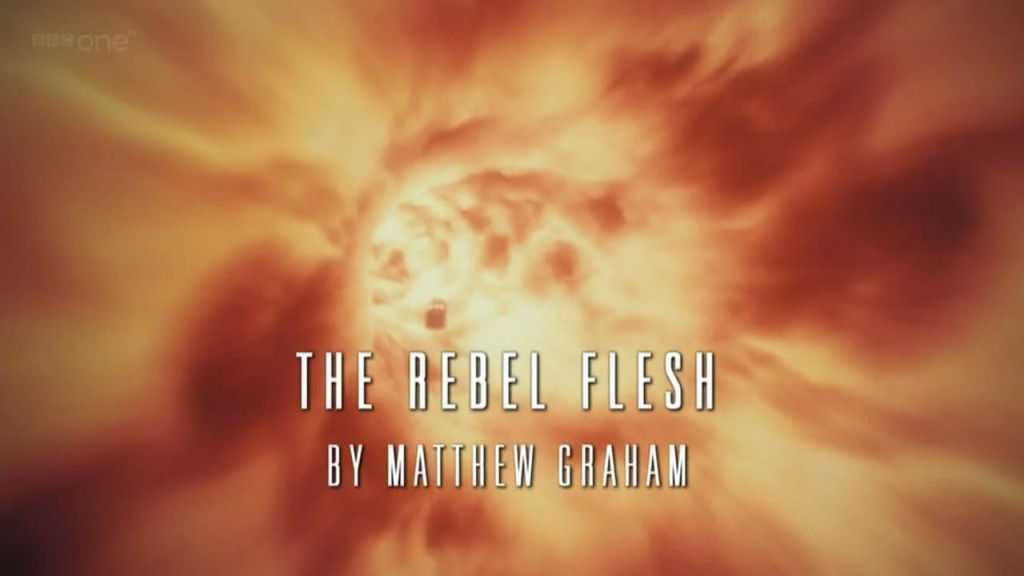
Spike: I had mixed feelings going into the episode, Matthew Graham’s previous Doctor Who experience was the episode ‘Fear Her’ which joined the unique pantheon of Doctor Who episodes that I found genuinely unwatchable and without merit. However Graham had also been instrumental in the creation and show running of Life on Mars and Ashes to Ashes two British TV shows which had massive spikes in quality, but were overall rewarding, entertaining and fascinating shows.
If last week’s episode was a love letter to the core concepts and mythology of Doctor Who, then ‘The Rebel Flesh’ felt like a full blown homage to the Doctor Who of old. In terms of structure, characterisation and even setting this felt like a throwback to old Tom Baker/Peter Davidson stories such as ‘The Ark in Space’, ‘Revenge of the Cybermen’ and ‘Earthshock’. There’s something pleasingly classical about stories set in deserted locale, with a cast of surly blue collar workers and a villainous bureaucrat. Villainous bureaucrats in particular are a trend that Doctor Who had seemingly abandoned, so it was refreshing to see the trope return in this episode.
It was also nice to CHUD favourite Rory getting a chance to branch out on his own and actual take up the usual companion role of blundering into danger due to their own innate goodness. I’ve mentioned it before but I think that Rory actually represents the humanity and heart of the TARDIS Crew in a way that Amy and the Doctor don’t. Amy is a far less humane companion than usual whilst The Doctor has been at perhaps his most alien in these last few seasons. As such Rory gets to be the caring one, the kind one, the one whose own goodness ends up with him being killed, or eradicated from time, or aged 2000 years.
Ian Pratt: This really didn’t do a lot for me, to be honest. In fact, for the first 20-30 minutes, I found myself glancing back and forth at the little counter clock in the bottom of the iPlayer screen. Once Rory rose yet again to the forefront, I started to take more interest but the story still never really involved me. I suppose that’s about right if, as you say, Spike, it’s an homage to eras of the show I’m still to catch up on. Still, I’d like to think I could appreciate a love-letter if it met me halfway. Last week’s episode excelled because it was every bit as intelligent and charming as its titular character. There was an irresistible energy about it, a freshness that meant it didn’t matter if you’ve seen every episode; it was written well enough to let everyone know what they needed to in order to appreciate all its flourishes and grace-notes. All this felt like to me was a stonewall filler episode with a few nice shots – like that Dutch angle on the freshly landed TARDIS – and a memorable line or two (“Always with the Rory!”)
My main problem with this episode is not the simplicity of its story or the lack of razzle dazzle compared to last week – every episode deserves a chance to prove itself, to make its own little universe and not always be compared back to favourites endlessly. It’s with the lack of spark in the little details, the touches that could have turned it into something more than a mildly diverting romp in the dark. Details like the Villains of the Fortnight. There’s nothing clinically “wrong” with the factory or its workers, but there’s also nothing terribly interesting about them. A collection of British accents and Zombie Dolphin makeup does not a band of worthy foes make. The cast made a decent fist of it, especially Sarah Smart AKA Ghost Emily Mortimer as Jennifer. However, even their combined weight couldn’t save moustache twirling guff like “we can strike at will!”. Thoroughly average; bar some excellent heroics from a very much alive Rory.
Spike: I think you’re doing the concept of the ‘gangers a disservice by viewing them as ‘worthy foes’. One of the key themes of Doctor Who has always been embracing the other, taking things from a different perspective and the ‘gangers represent that. They’re not villains in the classical sense; they’re just copies of people. The villain of the episode is unwillingness to accept ‘the other’ which is a point made by the fact that the first real act of violence is committed by an original rather than a ‘ganger. When I was talking about this episode feeling like homage, I really meant in terms of tone and spirit.
I do have issues with some pieces of writing, in particular I think the ‘ganger-Jennifer went from peaceful to homicidal way too quickly, but I think the episode did a great job of conveying the humanity of the ‘gangers and making us question their own monstrousness. The ‘ganger version of Cleaves, the obfuscating bureaucrat, in particularly actually seemed to be a genuinely more reasonable person than the original.
I think it’s clear that Graham wanted to establish the ‘moral quandary’ of the episode as soon as possible, and as such the episode feels more like a protracted ethics debate than a typical ‘base under siege’ episode. I think for the most part he succeeded, although I think stuff like Jennifer’s speech about being a child were perhaps overly manipulative. It’s understandable given the time constraints of the episode, but it did feel like Graham used every trick in the book to make us sympathise with the ‘gangers in that scene.

Ben: Consider me cautiously positive this week. It’s leaps and bounds above Graham’s last episode (which rumour has it was commissioned at high speed on very little budget, perhaps explaining why he lifted the plot from the little-known 80s Brit horror Paperhouse), and the monsters are, a couple of bits of dodgy CGI aside, an intriguing and effectively subtle bunch (especially on the makeup!), far more effectively ambiguous than last year’s ham-handed take on the Silurians.
Despite the various strengths of the episode, though (which also include the atmospheric location and, as other’s have pointed out, Rory finally getting his own character arc and a chance to act off people besides the other leads), the script and pacing were a tiny bit clunky in places. The old-school tone of the whole story (morally grey humans and people under attack in an industrial base are two of the most common plots in old Who) does lend itself to a fair bit of running round in circles, but there still seemed to be an unnecessary amount of characters running into and away from each other without real justification. It’s not a huge weakness here, but this is among the few very episodes of modern Doctor Who that feels a little padded out.
Given that the role of this episode was to raise moral (and practical) quandaries rather than answer them, though, it depends heavily on whether part 2 follows through the implications of the story – people competing with their own duplicates for single lives, moral implications of casually discarding the clones in dangerous work, etc. – rather than just conveniently killing the lot off. If it does wind up that all the ‘gangers conveniently die, I’ll be a little disappointed.
Spike: Just wanted to add, that I loved the sequence right at the start with Rory and Amy playing darts whilst the Doctor looks on. It really established the Doctor as a parent figure to the Ponds. I love how family like this crew is, there were elements of it in Season Five but its felt far more pronounced this year. It was also nice to hear some contemporary music. I’m something of a fair-weather Muse fan, so it was nice to hear ‘Supermassive Black Hole’, although ‘Uprising’ would have struck me as the more obvious track to use by them.
Kristina: Well, I’m still a Muse fan, so that put a big smile on my face. With this song and Adele’s ‘Rolling In The Deep’ popping up in the season opener, it feels like the show is lifting from my iTunes. As far as this episode goes, I was pretty bored, initially, due to coming down from the high that was ‘The Doctor’s Wife’ and the lack of any whiz-bang-pow shenanigans. Once I got to that locker room scene with Jennifer and Rory, the episode really took off. I liked the moral/philosophical dilemma that the ‘gangers represented. I liked that the ‘gangers weren’t really villains, and I loved that Rory manned up. Took him long enough.
Ian: Maybe it’s just because I watched Day of the Dead (1985) and Cronenberg’s The Fly again in the last few days, but as an exercise in claustrophobic tension, this fell some way short of the mark. I appreciate what you’re saying about the tone and spirit of the homage, Spike; that’s why I was so disappointed in the end product. I could tell what it was trying to accomplish and its intentions were noble. There wasn’t a single moment where I felt like it really gelled though. I actually liked the fact that this touched more on the internal evil aspect that’s mined so often in horror movies. What will ordinary people do when backed into a corner, etc? Again, it’s not so much a problem with the ideas so much as the execution. When I was supposed to be thrilling to the ethical debate taking place, I was left more with echoes of Blade Runner and Avatar and who knows how many others, influences this story never escaped the shadow of.
I should also hasten to add that I’ve never really thought much of Muse aside from ‘Starlight’ and ‘Muscle Museum’. Although the main riff in ‘S.B.H.’ is pretty tasty, too.
Spike: I love how ‘Starlight’ seems to be the main crossover song for Muse. I’ve lost count of the number of times I’ve heard drunken hordes bleating the song for karaoke. It’s like some sort of stealth football anthem.
Adam: “Gelled”. I see what you did there.
Ian: Thank you, thank you. Have you tried the fish?
Adam: Yes, they had fingers. It was unpleasant. Anyway, from what I’ve seen this is definitely the most old-school Who episode in a while, by which I mean there was a lot of pointless running around corridors to pad out a story that could have been told in half the time. It was like a post-it note reminding me of why I have a hard time getting into the old series. And then there was the return of the rather heavy-handed “Icky things are people too” theme, which as mentioned was last seen in the Silurian two-parter from last year. It’s a nice sentiment, and there’s a good chance they can do something interesting with it in part two, but as of right now it made me feel like I was watching a Very Special Episode of an 80s cartoon. It’s especially annoying how the show seems to drag these ideas out and really hammer them home in some episodes, and then forget about them entirely in others. It’s like the characters know that this week they’ll be confronting prejudice, and next week they’ll be back to killing icky monsters who are PURE EVIL.
One of my favourites of the Tennant era that wasn’t written by Moffat is the ‘Human Nature’ two-parter, which had the “bad guy” teacher who was pro-war, but they gave him respect–he had a monologue about the horrible things he’d seen in the war, but how he’d do it all again for queen and country. This show otherwise has a bit of a hard time delivering ethical debates without resorting to moustache-twirling, and that was seen again this week in the person of Miss Cleves.
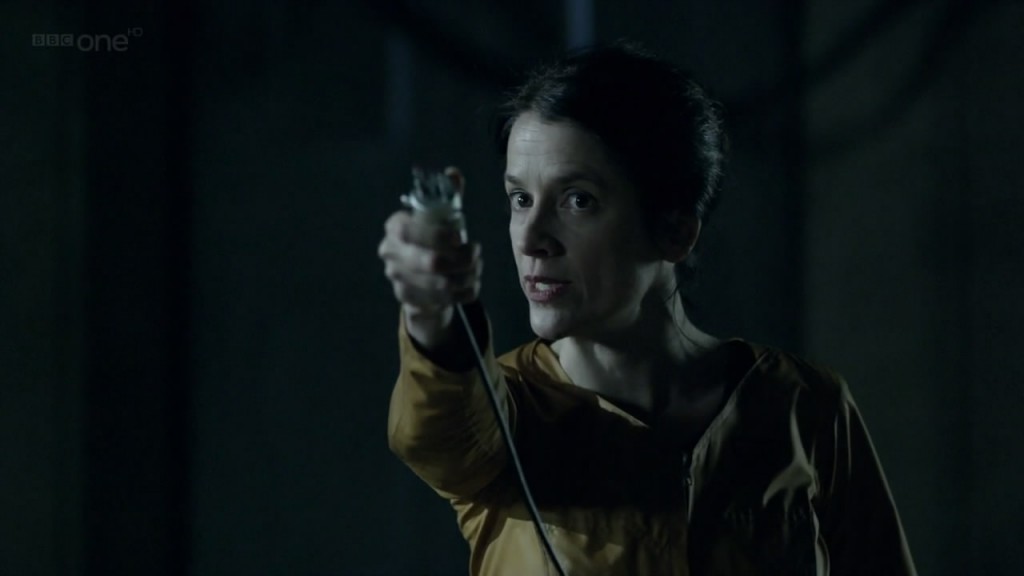
Ben: On the note of the underlying moral message, what I liked about this story compared to last year’s ‘In Cold Blood’ (which was a thoroughly inferior retread of a specific 70s story) was that I think it raises, or at least has the potential to raise, issues beyond “monsters are people too”. The episode already raised the practical problem of how the ‘gangers could possibly share the lives of their original templates, and provided that kind of question keeps getting thrown up I think this story could go places.
As for how often the show generally does this, it has a long-established trend of being non-judgemental until the monsters fire the first shots, and not always even then. There have been stories where The Doctor has been favour of killing aliens off as soon as he meets them, but aside from the Daleks those have been few and far between in the modern series- both House and The Silent had established themselves as decidedly antagonistic before the characters took any action against them.
Again, when it comes to the reactions of the supporting cast this week- chanting “us and them” was pretty poor, but the ideal of having their shortcomings voiced by their doppelgangers did lend a bit more depth to Miss Cleves than to most of the characters of her type.
I definitely think the ideas here were better than the execution, but the ethical issues raised by cloning is, in some ways, new ground for the series (the shoddy ‘Doctor’s Daughter’ really didn’t address it, or any of the likely implications), and the Doctor being confronted by one himself has, again, a lot of potential.
I suppose I liked this episode as much for what it could lead up to next week as for what it was, which certainly isn’t something I was feeling during the Silurian story.
As for Muse? Their work leading up to Black Holes and Revelations, yes, but nothing after.
Spike: I find that Muse are perfectly fine until you actually start to listen to the lyrics. Been a number of times where I’ve been listening to one of their songs and I’ve heard some of Matt Bellamy’s conspiracy laden lyrics and just had to cleanse the palette with ANYTHING else.
Adam: Sure, there’s definitely a lot of potential for part two, but there’s a difference between even poor execution of ideas and not really doing anything with them at all. Which is kind of what I felt here. Again, this could be all set up for the second part, but I honestly enjoyed the Silurian two- parter, taken as a whole, more than this single episode. The conflict between the Silurians and the humans was well-sketched out, and you could see how both sides would have motive to fight. Here, it felt a little half-assed–I wasn’t clear on why both sides went into attack mode immediately, and I didn’t feel like the conflict was organic enough. Yes, it’s creepy to see your doppelganger moving around on its own, but these people have been working with this technology for quite a while now. Surely they could at least wait to see what happens before instantly deciding they’re racist against rubber people?
The other thing is that the Silurians presented a bunch of cool dino-men and a trip to the land below the Earth. There wasn’t much to ‘The Rebel Flesh’ in terms of…mise en scene, I guess you’d call it. Just a bunch of dolphin people and corridors. The real potential coolness only kicked in at the very end, when Fake Doctor made his appearance. The idea of two Matt Smiths playing off each other is very cool and may end up elevating this two-parter way above ‘Cold Blood’ but as an individual episode, this was somewhat boring pure setup.
Kristina: The sudden declaration of war worked for me because of the moment between the guy and his ‘ganger where they discuss going to their son’s birthday party. That’s when the conflict became clear to me. There is only room for one. Two of them cannot and should not occupy the same space. It’s a fight for their lives in more than the biological sense. What loving father would stand idly by while someone else stepped into his position?
None that I know.
Even The Doctor admits that the situation is a complete mess. If there was some clone of myself wandering around, trying to take my life, I wouldn’t let it go lightly, either.
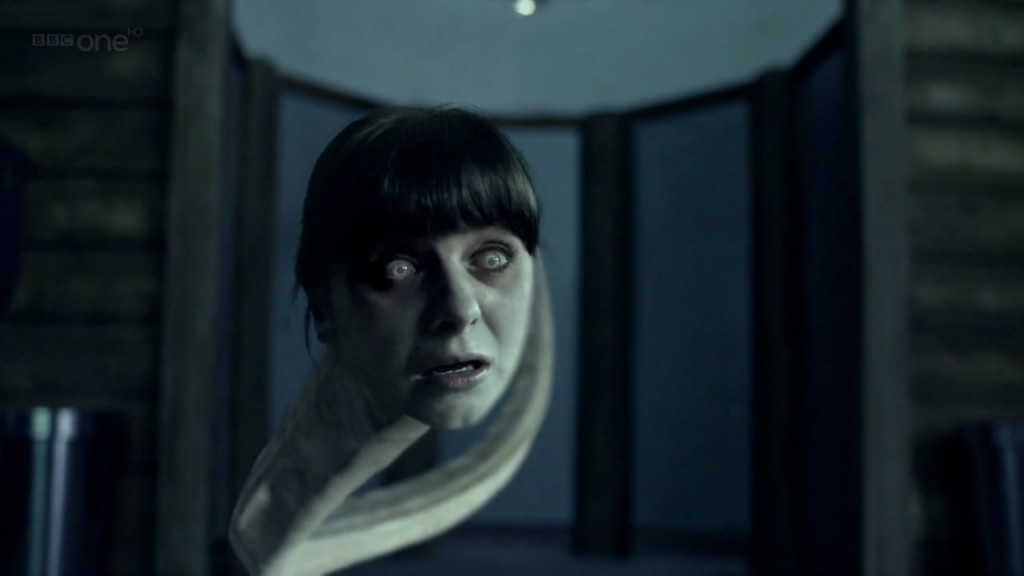
Ben: I have to admit, as an old series fan, the Silurians didn’t have that same novelty (aside from their underground city, which was a nice visual but little more), whereas the ‘gangers are something altogether new.
Spike: I admit to being a bit impartial to the episode due to the wealth of Northern Accents on display, it does my Yorkshire heart good to hear flat vowels on the telly every now and then. That aside, I do think you could class the episode as deliberately paced. Usually when I’m compiling screenshots there’s a wealth of scenes I know to go to, this episode had no such scenes. I still like the episode a lot, but it was in a lot of ways slightly uneventful.
Ian: This is why I very deliberately said “filler episode” earlier. Even for a story with this much potential, nothing suggested this deserved the two-part treatment. Adam’s point about the story’s frame or “world” highlighted the episode’s cheapness, an unfortunate but nonetheless unavoidable complaint. Everything from the workers’ suits to the SFX and makeup felt like leftovers, the best of the rest. It was like they’d been set a challenge: here is your set and costumes consisting of whatever we could find lying around; you may use only these and you may not leave the location, although you can craft whatever story you wish to occupy yourselves. The Silurian double-header, while not the strongest last season, worked for me because of the juxtaposition of the quasi-Colonial allegory with unapologetic, garish Sci-Fi trappings. This offering, by contrast, offered a dour palette without the gripping drama or superior supporting characters.
Speaking of creakiness, Eye Patch Lady is really starting to bug me. I’ve been holding off from saying it for a few weeks now, but she looks like something you’d see in an FMV video game on the Sega Mega-CD. There… I said it.
Kristina: You’re not alone. In the span of a few episodes, she’s gone from creepy to annoying. I’m hopeful that the reveal of whom or what she is will be worth it, but right now, I really couldn’t care less.
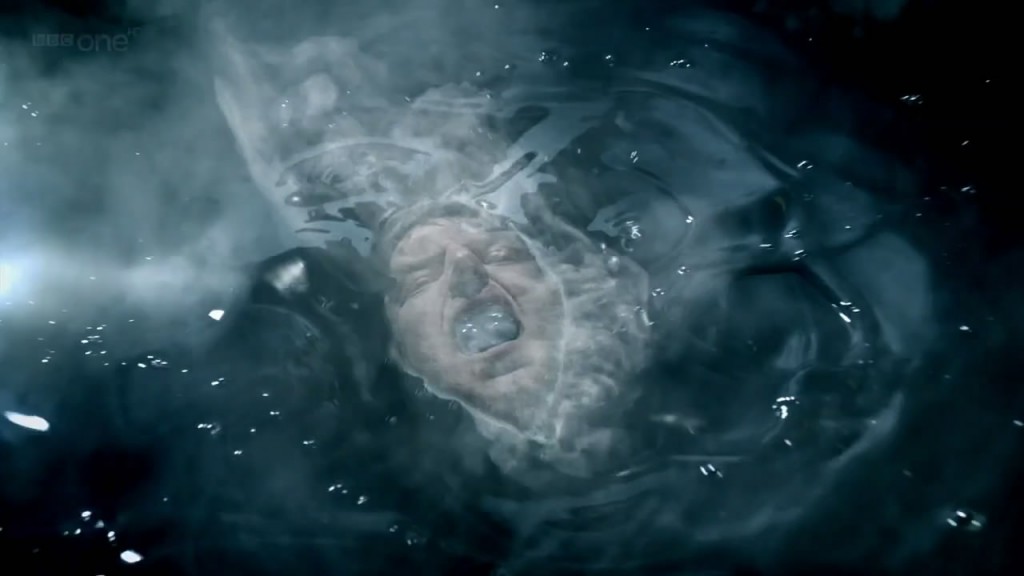
Spike: The cynical part of me feels that the trip to America for ‘The Impossible Astronaut’/’Day of the Moon’ might have tipped the budget in those episodes favour. It feels like we’ve had three bottle episodes in a row now (even ‘The Doctor’s Wife’ felt at times oddly restrictive).
Ben: I actually liked the design of the suits, and the industrial tech in this episode, though it did feel a little-hemmed in as a whole. Not to over compare to ‘In Cold Blood’, but most of that (especially part 1) was set in an almost entirely unmodified church that was meant to be a state-of-the-art scientific installation, which really did look lazy. This was meant to be an acid mine based in an old castle (at least partly, I’m sure, for the Frankenstein subtext), and I find it hard to fault it for that.
That said, budget and quality rarely have a lot to do with each other- look at ‘Midnight’ (easily the best Davies episode) or ‘Blink’s’ limited number of locations.
Adam: I do have to admit, though, this still felt more interesting than large swathes of the Davies run, where it felt like every second episode was set on modern-day Earth–and they had a much larger budget.
Spike: They’ve had to reduce the budget by 10% each season since The Specials, I think.
Adam: Well, there you go. Thing is, in some ways I’m grading this on a curve, because the Moffat/Smith run has been WAY more imaginative in terms of settings and ideas than the Davies. I don’t think we’ve had more than a handful of episodes that were set on modern Earth and none at all this season. So I have to give props for that, and this episode is suffering partly in comparison.
Still, I don’t think it’s wrong to compare it to ‘Cold Blood’. Which is a little worrisome, because that two-parter, along with ‘Vampires in Venice’, made up the weakest of last year’s episodes, and we’ve already had our ‘Vampires in Venice’ analogue with “Curse of the Black Spot”. If this season wants to measure up to the last, it needs to step up its game. (By this comparison, I guess ‘The Doctor’s Wife’ was ‘Vincent and the Doctor’, i.e. an emotional episode scripted by a big name writer?)
Ben: Well, if we’re going for a direct comparison, I’d put Pirates-of-the-almost-Caribbean on a par with Vampires of Venice (which I never really took to), Doctor’s Wife over Vincent and this well, well above Cold Blood, so we’re definitely on a strong streak.
And yes, agreed that this would have been a far more striking episode in the RTD era.
On an unrelated note, various people have suggested that the Doctor’s hints about what the Flesh might become are in reference to:
- the origins of the Nestene/Autons
- the Sontarans (who are a clone race, after all)
- Time Lord regeneration (which was something they originally derived from technology, not a natural ability)
I’m fairly sure the first two are wrong, as both have been strongly established as extra-terrestrial, but it’s an interesting set of possibilities, though I’m all for it being something entirely new instead.
Adam: Ugh. I could live with it being the Autons, but PLEASE don’t let this be the origin of the Sontarans, and especially not the Time Lords. That ties into a recurring problem I have with a lot of SF and fantasy these days, the idea that everything has to tie up in a neat little package that relates to humanity and, if at all possible, the main characters. It makes everything seem so small and boring. I realize it’s harder to write for something truly alien, but that’s why it’s all the more important and satisfying to do so. Even when you do get aliens, like in Avatar, they have to be as human-like as possible. It’s not just annoying; it’s downright disturbing, because fiction is one of the most important ways of trying to get outside our own heads. If all we ever hear in the media is constant reassurance that we’re the most important thing in the universe and that everything unlike us is a “monster”, I think we’re in danger of losing a certain natural empathy.
For Pete’s sake, it’s getting harder and harder to find good characters who aren’t white straight male Christians on TV, let alone empathically written aliens.
Ben: I’d agree, though I think the likelihood of it being a nod to anything is slim. While it could be a more primitive version of the same technological tree as the Time Lords or Sontarans, and simply humanity’s own development along that path, I’d much rather it was something altogether new.
Casey: I have to say I was getting into this episode more and more especially with the Frankenstein comparisons going on (the less said about my obsession with that book the better). I loved the old castle and hallways and weird creatures/clones with all the appearance of humanity. And as Spike said, this was very much a throwback episode like the last with its look and setting from the running through many, many hallways to the simple costume design.
Really digging on Rory this episode and good to see him really take charge. We haven’t seen this since his taking off for his 2,000 years of watching over Amy, and it was a very nice thing to see. He also is clearly the one who would sympathize the most with the ‘gangers because of his former plastic state.
I really want to know though what the Doctor seems to be hiding here with the ‘gangers and who they might become. Also, what the possibility of an alternate Doctor actually means for the season?
It wasn’t a great episode or a perfect one, and really, whoever went after Neil Gaiman’s episode last week was going to have big shoes to fill (no pun intended, I think). But, I do have to say it was a very spooky and creepy episode and I spent a good chunk of it with a little boy behind me peeking his head around me to watch it and constantly saying to me, “It is scary daddy. But not too scary for me not to watch it.”
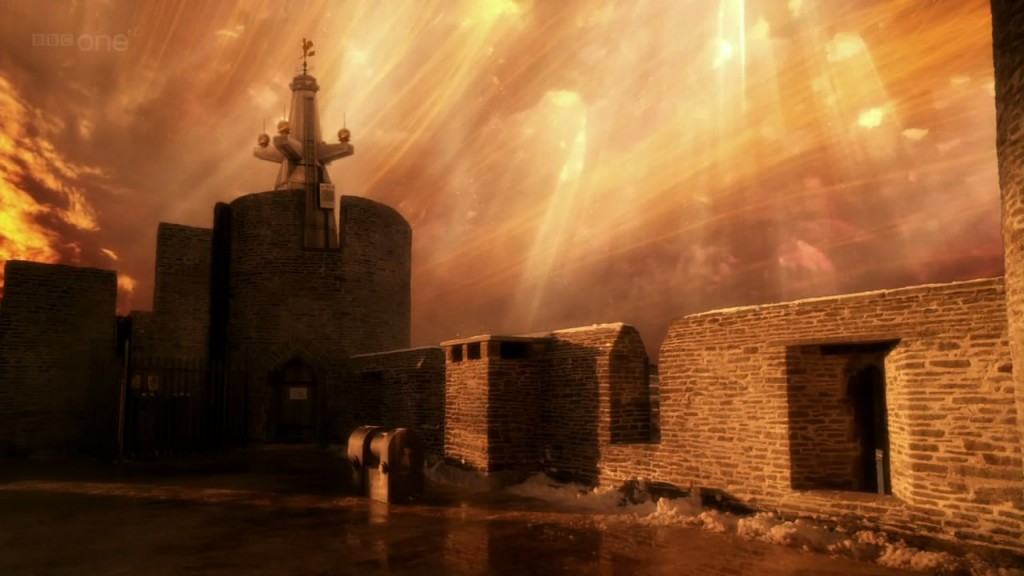
Spike: I think that Frankenstein aesthetic is one of the reasons I really got into the episode. With the solar storm changing the lighting and the main action taking place within an old priory it almost felt like watching an old Universal monster movie at times. I think one of my frustrations with this episode is that the split in the season makes each episode feel more precious. It’s one of the reasons I found ‘Curse of the Black Spot’ to be generally vexing.
Casey: I just found ‘Curse of the Black Spot’ not to add anything to the show. This looks like it is really going where and going to add something to the show, whether it is a new villain or species to something which actually impacts these characters.
And nice to have Amy see creepy one eyed lady this time and looking forward to what happens with that next episode as well.
Ian: The Frighteners shot of the face poking through the goo was another nice touch. That’s the whole issue with this episode in microcosm though – the best thing about it is something that reminds me of something else.
Spike: To be honest, even aside from generally liking the thematics and look of the episode I really enjoyed seeing the TARDIS Crew playing off each other. Gillen, Darvill and Smith as well as sounding like a particularly nasty law-firm have such amazing amounts of charisma together that I’m happy just to watch them ‘exist’ within the episodes.
I also liked seeing Amy and Rory sort of switch roles this time, with Amy being generally suspicious of Rory’s new friend. I loved the line where Jennifer says ‘any girl would be lucky to have you’ and Rory reacts like he’s never actually heard that before.
Kristina: I’d bet that he hasn’t heard that before. Amy’s had Rory by the balls for years, and women like that don’t compliment their men. Ever notice how she doesn’t act like she loves him unless one of them is kidnapped/dying/dead? That’s not a coincidence. Amy knows that he’s not leaving, so she mistreats him, and the poor guy is so taken with her that he tolerates it. Being around The Doctor has got to be emasculating, too. It’s not until Jennifer bats her eyes at Rory that he mans up. That moment where he barks “No, YOU listen!” at Amy was long overdue. Another bit where Amy puts her hand on his arm in an attempt to reassert her alpha status in the relationship, only for Rory to shirk her hand and physically turn away from her and toward Jennifer was a moment that I watched at least ten times. I love that Amy is jealous, because God knows that woman has a roaming eye. She ogled The Doctor’s butt-naked bod right in front of Rory in ‘The Eleventh Hour’ and tried to sleep with The Doctor in ‘Flesh and Blood’, so I feel no sympathy for her whatsoever in this instance. She’s got no right to be upset about Rory trying to protect someone else, even if that someone else is a cute lady.
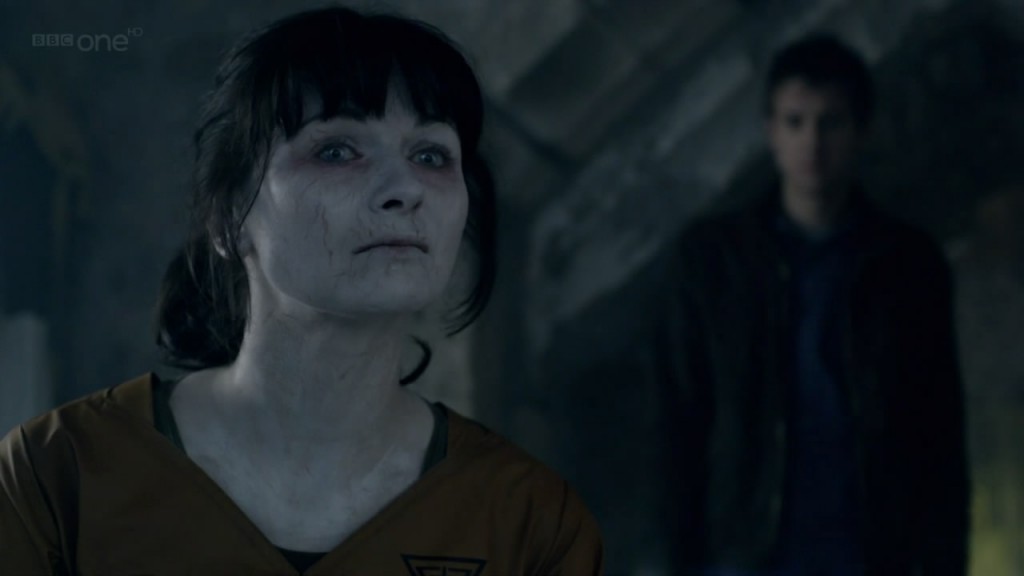
Ian: What was more perfect: the fact that, as you say, Amy was obviously keeping an eye on things there? Or the fact that Rory would come down with a sudden burst of confidence after something like that? It was very well observed the way Jennifer had him onside with the puppy dog eyes routine. Of course, he’s too much of a gent to actually give Amy any real reason to worry about shenanigans. And I thought last week was a pat on the back for my man Rory with the TARDIS fancying him…
Adam: I couldn’t help but notice that the Doctor was back to whacking the TARDIS and going “what’s wrong with this crazy thing?” despite getting straightforward confirmation last week that yes, the TARDIS is alive and working to take him where he “needs to go”. I realize there are logistics involved in syncing up the scripts, and continuity isn’t this show’s strong suit, but come ON.
Spike: The Doctor was being kind of tricksy the whole episode, it actually reminded me of how the Seventh Doctor was eventually retconned into this Machiavellian player of games. He seemed to hint that he’d been there before and knew a lot more about what was going on than he was letting on.
Casey: Exactly. Which is why I am hoping and betting this two parter has a bigger impact on the series or characters than Black Spot, which was a complete throwaway episode.
And I didn’t expect to see the TARDIS and the Doctor go back to working perfectly. It has generally been said the Doctor isn’t that great at flying her, and as we have seen in her human form, she is quite temperamental. Besides, part of the fun is the fact the Doctor and the TARDIS have this bickering relationship with how he flies her (and I think from now on the TARDIS will be a her, for me at least).
Adam: It seemed like the Doctor was back to thinking of the TARDIS as a hunk of malfunctioning machinery rather than a conscious entity who was steering him where he needed to go.
Spike: The Doctor’s always been a bit inconsistent, but with the way episodes have been shifted around this season I doubt they could have managed any kind of consistency.
Ben: I actually think the Doctor’s playing a long game this season – it was strongly implied that this was where he was headed when he wanted to ditch Rory and Amy at the beginning of the episode, and he’s been acting evasive ever since. Like so many other things we’ve been over, though, that’ll stand or fall on part 2, and if it turns out to be a clichéd mess that mops everything up neatly I’ll be the first to throw up my hands and admit I was wrong about the story.
Unrelated, but how long has it been since the Doctor and crew had access to the Tardis cut off? It’s a real old series cliché (rather akin to malfunctioning transport decks on Star Trek), but one that’s been fairly absent in recent years.
On yet another note and I know this is turning into a weekly comment, but Darvill again did excellent work this week.
Agreed with Spike on the character chemistry as a whole, too- this ensemble of actors works really well for the show in a way that hasn’t been done in a long time. I always preferred the Doctor having several companions to just a string of random young women, and it gives the show a lot more character arcs and interactions to play with.
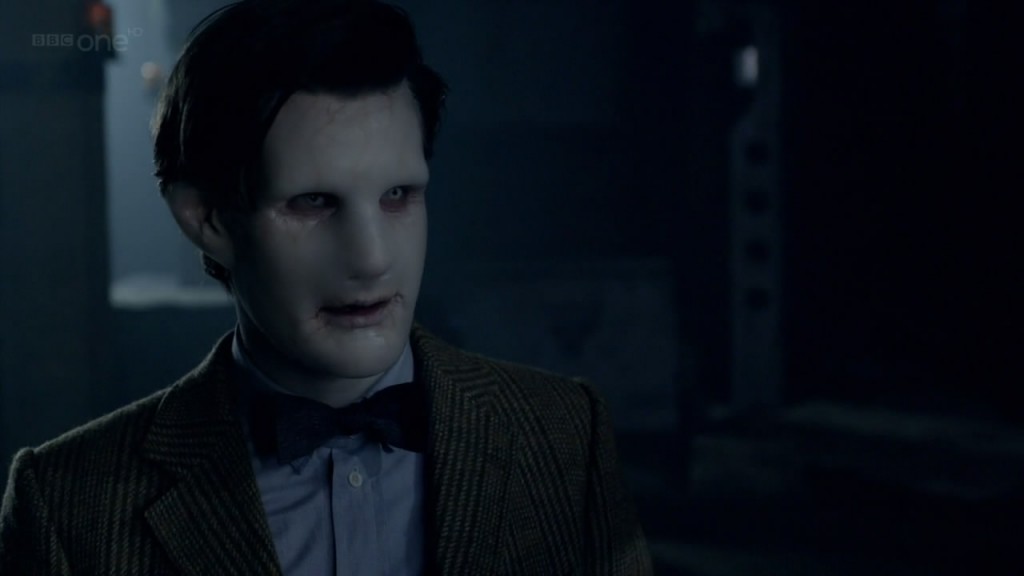
Adam: Other than having some real fun with Clone Doctor (Cloctor?) the best thing “The Almost People” could do would be to push the meta-plot along a little more–they don’t have to reveal who Sliding Panel Woman is or anything, but having the Doctor mention Amy’s pseudo-pregnancy, or manage to sneak off and get some more information as he was apparently planning at the beginning of this episode, would help a lot. I like stand-alones if they’re done well, but there was so much thrown at us in “Day of the Moon” that I can’t help feeling it needs several episodes to sort it all out. By this time last year we were starting to see the “cracks in the universe” storyline make sense and develop into a threat we understood, more or less. This year it’s been CRAZY KID IN SPACE SUIT WHO REGENERATES AND SILENCE BUILDING A TARDIS AND THE DOCTOR WILL DIE, and then, hey, pirates. I did like the suggestion that Cloctor is who we see getting shot in The Impossible Astronaut, so that would be pretty satisfying. Maybe Cloctor will become a running character, like the Buffybot!
Also, I love saying Cloctor. CLOCTOR! I’m calling him that even if you all refuse to. And you would be right to.
Spike: I’m fully expecting the next episode to end with the Doctor standing over the corpses of the ‘gangers and The Cloctor and be all “this is why HUMANITY IS INHERENTLY FLAWED” and then sulk off.
Ben: If we get another Tennantish ending like that I’ll be horribly disappointed. Graham may be spotty, but he’s no Chris Chibnall. Ideally, at least some of the humans will die and have their ‘gangers take up their lives in place, or they’ll pull an “everyone’s a ‘ganger in the first place” twist.
David Brin’s novel Kiln People was a fairly good take on the implications (both economic and moral) of a society based on short-lived clones, and I’m hoping for something a little similar.
Oh, and count me in on Cloctor.
Casey: Cloctor. I despise you all. It is already stuck in my head.
We either get some insight into Rory and his 2,000 years, or we get a hint as to who was killed in the first episode. That is my guess right now for the end of this two parter.
Ben: On the plot arc front, remember what Moffat pulled last year? Where the cracks were deliberately obvious and what we were actually missing was backwards-travelling Doctor? I’m quite certain we’ll see the same here- eye patch woman and the pregnancy are too much in our faces. I think they’re as much a diversion as anything, and could be resolved pre-break, in episode seven.
Adam: The trouble with some of the meta-plots on Doctor Who is that they basically amount to Easter Eggs that pay off at the very end, rather than a real “plot” per se. I was worried initially about the Cracks in Time just being another version of this, but it actually did turn into a storyline (and, as mentioned, the real trail of hidden clues was something else entirely). I am getting a little worried about Sliding Panel Lady being another Bad Wolf, i.e. something shoehorned into every episode with no real development, but I suppose I should trust Moffat more at this point. I’m sure that the cliff-hanger in two weeks, ‘A Good Man Goes To War’, will advance this story. So I guess I should stop talking about it until then.
Spike: I think Moffat has generally been better with clues and hints than RTD, largely because he’s been a lot more explicit with them. I think Moffat likes to have all of his pieces on the board and then surprise you with their configuration, whilst RTD tended to shroud everything in secrecy and then surprise you by revealing he was playing Connect-4 all along.
As it stands it’s hard to discuss an episode like this without having seen the second part, it lives and dies based on how well it sticks the landing and if these overall thematics play into the main plotline.
Adam: In conclusion, CLOCTOR.
Ben: Lots and lots of potential without much actual storytelling. It all rides on next week.
Ian: This hasn’t even took off yet for me so it has a long way to go before it can start thinking about sticking any landings. I’m not writing it off – it’d be silly to – but there has to be something special in store for us next time, it it’s to escape textbook filler status. And it’ll take more than another Eye Patch cameo to achieve that (I really hope those haven’t just been shoe-horned in to keep something underwhelming bubbling away.) It’ll even take more than Amy and her almost hypnotic leather jacket/painted on jeans to achieve that.